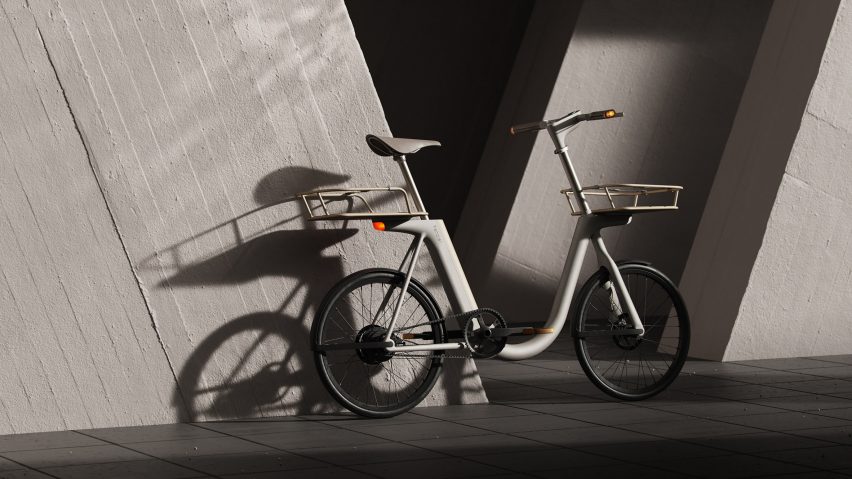Benjamin Hubert's studio Layer has designed a concept electric bike called Pendler that aims to tackle all the pain points of urban commuting.
Pendler is a compact bicycle with a distinctive symmetrical U-shaped frame, a concealed motor and detachable timber accessories.
Layer aimed for the design to bring together two usually disparate elements of cycle design: high performance and a "crafted" aesthetic.
At the same time, the studio wanted to provide built-in solutions to common obstacles people encounter when cycling in cities, such as how to store the bike, squeeze it onto public transport or communicate with surrounding traffic.
"Our observation has been that although there has been been a boom in brands and vehicle offerings, they have generally towed a very tech-driven positioning and aesthetic without necessarily tackling a number of pain points of the daily city commute," Hubert told Dezeen.
"Our concept hinges on two areas – subverting the tech mobility aesthetic with a crafted and considered design language and providing tangible physical solutions to daily issues."
To help with storage in small apartments and shared houses, Pendler folds flat, as the pedals fold down and the handlebars rotate 90 degrees.
It has relatively small 20-inch wheels and an overall compact size, which Layer says would also make it easier to take onto public transport.
A front and rear basket are modular and detachable, so they can be added when there is luggage or shopping to carry and removed when there's not, making the bike lighter.
Both are wire with a slatted timber base and integrated straps to hold objects in place, and Layer suggests they be hung flat on storage hooks in the home when not in use.
The timber slats are meant to bring warmth and add to Pendler's aesthetic, as are the leather saddle and handles and the minimal frame.
The frame is made of standard circular steel tubing shaped to give "a more organic, fluid expression", according to Layer.
Its U shape is not only meant to be eye-catching, it is meant to make it easier to get on the bike regardless of what a person is wearing. It is also inclusive of people with restricted mobility.
"E-bikes are perfect for those of us with mobility challenges so a simple step-through enables a wider demographic of users to enjoy personal travel," said Hubert.
"This is at odds with the traditional 'performance' frame format of a large triangular structure, but we see performance as enabling a universally great experience for all at Layer."
Pendler also incorporates a phone dock, height adjustability on its saddle and handlebars, and integrated indicator lights so the rider can communicate their turning intentions to others without taking their hands off the bike.
Its speed is controlled via the handlebars and the 45-newton-meter (Nm) motor is powered by a removable 250-watt-hour (Wh) battery. A single charge can carry the bike for 70 kilometres, which Layer says is ideal for commuting.
Pendler's name comes from the Danish word for commuting, giving a nod to one of the cultures with the strongest cycling tradition.
Hubert founded Layer in 2015. Other recent concept designs from the London-based studio have included a collection of status quo-challenging connected home devices and an autonomous ride-sharing service based on aeroplane cabins.

